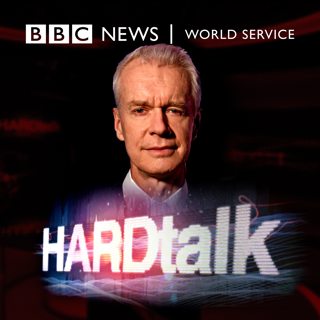
Grigory Yavlinsky - Co-Founder Yabloko Party, Russia
So much for all the talk of a Moscow Spring. Despite sporadic street protests and the stirrings of middle-class rebellion, Vladimir Putin is back in the Kremlin and Russia's economic and political status quo remains intact. Why do liberal opponents of Putin struggle to gain traction? Stephen Sackur speaks to Grigory Yavlinsky, economist, reformer and a veteran leader of Russia's fragmented opposition. Will the liberals ever win in Russia?
23 Maj 201223min

GUY SCOTT – Vice President of Zambia
At last Sub Saharan Africa has a positive economic story to tell, but is it being matched by improved governance? Are Africa's leaders making the best use of the current surge in economic growth to tackle endemic poverty? HARDtalk’s Stephen Sackur speaks to Guy Scott, recently appointed vice-president of Zambia. He is a trained scientist, an ex-farmer, and he happens to be the most senior white official in post-colonial Africa. It is tempting to see him as a symbol of a continent no longer trapped in its past, but is it true?
22 Maj 201223min

Louis Saha - French footballer
Football is a global obsession - the star players of the sport, the likes of Messi, Rooney and Ronaldo reap vast rewards and worldwide adulation. But there's a sense of something rotten in the people's game. A sport worth billions of dollars has fallen prey to match fixing, cheating and bouts of shameful behaviour. Stephen Sackur speaks to Louis Saha, a French international striker, currently with Spurs in the English Premier League. His is the view from inside the football factory - has the joy been taken out of the beautiful game?
21 Maj 201223min

Michalis Sarris – Chairman, Cyprus Popular Bank
Greece appears to be inching closer to the Eurozone exit door. If the Greeks leave how far could the contagion spread? One country which could very soon find itself in the eye of a financial storm is Cyprus - where the banks are paying a heavy price for their investments in Greece. Stephen Sackur speaks to Michalis Sarris, chairman of the Cyprus Popular Bank and former minister of finance. A mountain of banking debt, a weak government, an angry public - could Cyprus be the next domino to fall in this Eurozone crisis?
18 Maj 201223min

Sir William Patey – British Ambassador to Kabul, 2010-2012 (Retired)
Has western military intervention in Afghanistan failed? The question will hang over this weekend's Nato summit in Chicago as the alliance's political leaders set the seal on a phased military retreat while pledging long-term support for the Afghan Government. Stephen Sackur speaks to Sir William Patey who has just retired from his post as British ambassador in Kabul. Did the West get the balance between war and diplomacy fundamentally wrong in Afghanistan?
16 Maj 201223min

Nasser Judeh - Jordan's Foreign Minister
Jordan has survived the Arab Spring relatively unscathed, at least so far. Perhaps it is because the king has promised reform. But he is now on his fourth prime minister since the start of 2011 and the changes proposed so far won't do enough to satisfy his critics. They say King Abdullah is just buying time and is not serious about reform. And this in a country seen as critical to peace in the region not least because of its troubled neighbours, Syria and Israel. So how much time does Jordan have to sort itself out? Nasser Judeh, foreign minister of Jordan, talks to Sarah Montague.
14 Maj 201223min

NORMAN FINKELSTEIN – Political scientist
American Presidents have long been criticised for being too in thrall to the Jewish lobby, and that American Jews influence US foreign policy, which explains America's unwavering support for Israel. So what happens if American Jews fall out of love with Israel? That's what the Jewish American academic Norman Finkelstein claims is happening. He suggests that American Jews are now unhappy with what Israel is doing and they want to distance themselves from the country. Finkelstein is nothing if not controversial. He, after all, is famous for accusing Jews of exploiting the Holocaust. His actions have resulted in him being banned from entering Israel. Could he be right and, if he is, what does that mean for America's Middle East policy?
11 Maj 201223min

09/05/2012 GMT
The west faces a lost decade of economic stagnation. Unemployment is high, inequality is rising and governments are broke. Should we be blaming capitalism or looking to the market for solutions?HARDtalk’s Stephen Sackur speaks to Sir Ronald Cohen, one of Britain's most innovative business leaders. He is a pioneer of venture capitalism who is now committed to the idea of social investment, or capitalism with a conscience. Can the private sector combine a commitment to profit and the public good?
9 Maj 201223min






















